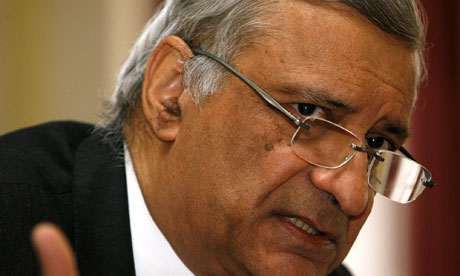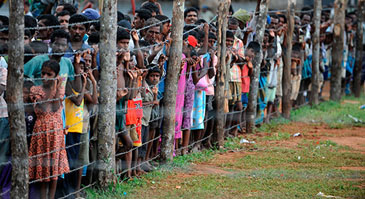
Kamalesh Sharma, the Commonwealth secretary general, says it is not his job to speak out against abuses of human rights. Photograph: Akira Suemori/AP
The Commonwealth has abandoned its commitment to defending
human rights, according to a leaked document obtained by the Guardian in which the secretary general tells his staff it is not their job to speak out against abuses by the 54 member states.
David Cameron and the foreign secretary, William Hague, have both said they will put new emphasis on the Commonwealth in Britain's
foreign policy. But the organisation's London-based institutions, the secretariat and the charitable foundation, are both in turmoil, riven by disputes over their purpose and direction, and internal wrangles over the treatment of staff.
Coming soon after the well-publicised shortcomings in India's preparations for the Commonwealth Games, the latest revelations about dysfunction within the secretariat and foundation are likely to add to questions over what the Commonwealth is for. The most threatening internal rupture is over human rights. Staff at the secretariat were furious when the secretary general, Kamalesh Sharma, remained silent over a series of abuses by member states in recent years.
For example, when the Gambian president, Yahya Jammeh, threatened to behead homosexuals in 2008; when government troops and Tamil Tiger rebels were accused of widespread atrocities at the end of the civil war in Sri Lanka last year; and when a Malawi court in May sentenced a gay couple to jail for being homosexual, the secretary general ignored calls from secretariat staff urging him to express concern at least.
"All those cases were all about the values the Commonwealth is supposed to stand for and we failed," said one staff member. "I feel we could become moribund."
In response to complaints from employees, the secretary general's office told his staff that the institution had no obligation to pronounce on the issue.
"The secretariat … has no explicitly defined mandate to speak publicly on human rights," Sharma's office told senior staff. "The expectation is that the secretary general will exercise his good offices as appropriate for the complaint and not that he will pronounce on them."
Human rights activists said the comments represented a reversal of the Commonwealth's tradition of speaking out over gross abuses, such as apartheid. They said the secretary general was contradicting a key policy document adopted by Commonwealth heads of state in 1995 that calls for the "immediate public expression by the secretary general of the Commonwealth's collective disapproval of any such infringement" of democratic values and fundamental human rights.
Purna Sen, the head of the secretariat's human rights unit, said yesterday: "We have been accused of being over-cautious. Our work below the radar is extremely important but we need to explore more fully where we can make public statements. Public comments need not be condemnations, but we need to defend our values."
Others question whether quiet diplomacy by the secretariat has been effective, as states have little to fear from the Commonwealth.
Danny Sriskandarajah, director of the Royal Commonwealth Society, said: "I recognise the Commonwealth often works behind the scenes, but without public achievements on its values it will lose credibility."
He added: "Many of the Commonwealth institutions were created in the 1960s and have structures and hierarchies that now seem outdated. It needs to modernise its institutions if it wants to be fit for purpose in the 21st century."
The Commonwealth Foundation, a charitable trust aimed at promoting co-operation between professional bodies in the member states, has also been split since a decision last year to cut direct funding for HIV and Aids prevention programmes by more than half.
The internal dispute came to a boil last October when the woman in charge of the programmes, Anisha Rajapakse, was suspended, escorted out of the foundation and then summarily dismissed, on the basis of allegations by an intern.
According to the foundation, the intern alleged that Rajapakse had tried to persuade her to forge a letter purported to come from a civil society group complaining about the cut in funding.
However, the intern, Elizabeth Pimentel, wrote to the foundation's board of governors in August distancing herself from the allegations.
In her letter, a copy of which has been obtained by the Guardian, Pimentel said her name had been "wrongly connected" with the disciplinary action against Rajapakse, and that she had not wanted remarks she made to the management "to be construed as a complaint at any point".
She added: "My discussions have been misinterpreted and used out of context."
Rajapakse and Pimentel both refused to comment on the dispute, which is due to go before an employment tribunal in December.
Two other members of the foundation's 20-strong staff have started grievance procedures against its director, Mark Collins. A secretariat staff member said: "There is a climate of fear at the Foundation. Everyone is afraid of doing something the director does not like because of what happened to Anisha."
Collins said it was an "undesirable situation" to be the focus of so many staff complaints at the same time but denied that there was any systemic problem at the foundation.
He said Pimentel had not formally withdrawn her original allegation against Rajapakse. "At the time, she felt that an investigation was justified," he said, suggesting Pimentel had since become "fearful" over the impending employment tribunal.
 Pandemonium reigned in Jaffna when the Public Library was stormed by hundreds of unarmed assailants on October 23.
Pandemonium reigned in Jaffna when the Public Library was stormed by hundreds of unarmed assailants on October 23.














 Kamalesh Sharma, the Commonwealth secretary general, says it is not his job to speak out against abuses of human rights. Photograph: Akira Suemori/AP
Kamalesh Sharma, the Commonwealth secretary general, says it is not his job to speak out against abuses of human rights. Photograph: Akira Suemori/AP 



